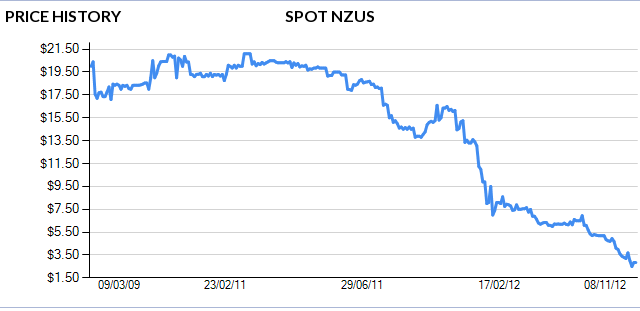 In this post Simon Johnson aka Mr February channels his inner General Westmoreland and his Vietnam flashbacks to look at National’s latest change to the New Zealand Emissions Trading Scheme (NZETS). Parliament has just (8 November) passed amendments that indefinitely defer any greenhouse gas obligations for agriculture and indefinitely discount obligations to industries.This is a ‘last helicopters off the Saigon hotel roof’ point in the sad history of the always-doomed-to-fail New Zealand Emissions Trading Scheme.
In this post Simon Johnson aka Mr February channels his inner General Westmoreland and his Vietnam flashbacks to look at National’s latest change to the New Zealand Emissions Trading Scheme (NZETS). Parliament has just (8 November) passed amendments that indefinitely defer any greenhouse gas obligations for agriculture and indefinitely discount obligations to industries.This is a ‘last helicopters off the Saigon hotel roof’ point in the sad history of the always-doomed-to-fail New Zealand Emissions Trading Scheme.
According to cultural folklore the humiliating end of American engagement in the Vietnam war was foreshadowed by graffiti;
Will the last person out of the tunnel please turn out the light?
Or perhaps:
Would the last Marine to leave Vietnam please turn out the light at the end of the tunnel?
This was in frank contrast to the early (with hindsight, unjustified) optimism of General Westmoreland, who had said in 1968 that he could see the light at the end of the tunnel of the war in Vietnam.
So why am I writing about graffiti from a war that ended 37 years ago? Well, to make a ‘bonkers’ analogy with the New Zealand Emissions Trading Scheme, of course! Getting the NZETS established was of course more or less a civil war, and when the Labour Government in its final days in office in late 2008 finally coalesced a coalition of compromise to pass the Climate Change Response (Emissions Trading) Amendment Act 2008, it seemed there was ‘light at the end of the tunnel’ in terms of reducing GHG emissions.
However, with the adoption last Thursday afternoon (8 November) of National’s latest emitter-inspired fiddle; the Climate Change Response (Emissions Trading and Other Matters) Amendment Act, I believe we can now just be honest with ourselves and see the latest amendments to the NZETS as the last helicopter off the hotel roof and the last act of the NZ emissions trading approach, which was futile from the beginning.
I have posted before about the Climate Change Response (Emissions Trading and Other Matters) Amendment Bill, noting that the amendments will;
- indefinitely exclude emissions from pastoral agriculture from the NZETS, instead of including them from 2015, which was already a delay from 2013.
- extend indefinitely the discount to industries, the ‘surrender one unit for two tonnes’ of emissions (half price!) that was to end this year (“maintain the 1-for-2 surrender obligation after 2012, without specifying an end date in legislation”)
- extend indefinitely the price cap, (“maintain the $25-a-unit fixed price option after 2012, without specifying an end date in legislation”).
And I have previously posted that the worst aspect of the NZETS is not the corporate welfare in the form of excessive free allocation to industries.
For me the worst aspect of the NZETS is it’s absolute exposure to the international carbon markets which has the effect of knee-capping the NZ carbon price down to the rock-bottom international carbon price. Today, the highest offer for a NZU for a tonne of CO2-e is $2.55 (See today’s price and the chart of the price trend from OMF Ltd).


So I concluded I agree with Jeanette Fitzsimons that the NZETS is so bad at reducing GHG emissions, it no longer matters what amendments are made to it.
That is why I think that the light at the end of the NZETS tunnel was always going to be eventually turned out. The final bit of the Vietnam analogy is who was going to turn out the light. I give that role to the professional big emitter’s lobby groups, led by Business New Zealand and its astro-turf subsidiary the Greenhouse Policy Coalition.
Nicky Hager, in his Bruce Jesson lecture, describes how lobbyists such as Business NZ and the Greenhouse Gas Coalition have manipulated the under-resourced media to give prominence to ideas pushed by their clients;
“…the public spaces are cluttered with paid spokespeople and commercial agendas” whose technique is to establish “usefully biased ideas” by creating “some common lines that become the ‘mantra’” and then, ‘keep repeating it endlessly’ “ so that “the angle, timing and quotes (in the media), do not come from journalists’ observations or journalists’ questions, but from the calculated efforts of PR and marketing people”, and, as a consequence, the political debate is dominated by “endless hectoring from the business lobby groups”
The media ‘mantra’ pushed by the lobbyists is that if the NZETS establishes an effective carbon price on emitters, then jobs and exports and GDP will be lost (See GPCNZ 2008 and Business NZ 2012). Over the years of the debate over the NZETS, we have been endlessly hectored by business lobbyists that business trade competitiveness will be affected by the NZETS. Ministers Nick Smith and Tim Groser have long ago joined in and ‘costs on businesses’ is now routinely given as the reason for the lack of any real bite in the NZETS.
The endless hectoring that the “NZETS will affect exports and jobs” has been so successful that the big emitters wound up the the Greenhouse Policy Coalition back in March 2012. I guess they had a helicopter to catch, after they turned out that light in the tunnel.

So at last the window dressing ETS scheme is plain for all to see, a mask for inaction , a tool to obstruct effective moves to reduce emissions.
Could the opposition collectively announce that it will repeal ETS legislation in favour of the introduction of a straight carbon tax at source? This would include carbon taxes on imported products? Then there would be no exceptions, no scope for corruption. Nor are aspirational goals – so much GHG reduction by 2030 say – of any value. They are simply schedules for delay when what can be initiated now toward real change should be initiated now.
Should climate change legislation require all businesses, institutions, and services to draw up plans for the rapid as “possible” reduction of greenhouse gas emissions, those plans subject to public examination with annual public compliance reports. Would there be a public examiner of compliance reports?
The word “possible” would imply government action to create the climate for change instead of obstructing it as now. We even have tools to evaluate the measures taken.
Noel
Flicking through some oldish Time magazines I came across this letter:
“Bryan Walsh writes that the planet is in peril and that we seem to be completely incapable of doing anything about it. (“The Earth Summit Can’t Save the Earth, June 25). The truth is that we are refusing to accept the extra costs to do anything to modify our ecology.” Paul Beauchesne, Paris. Time 16.7.12
He is so right. We have the capability to reduce emissions, our society lacks the will to finance changes.
I agree with Noel, a carbon tax, as proposed by James Hansen, seems the fairest and most effective way to reduce consumption of fossil fuels – and to make people more inclined to demand action on “clean” energy.
A Public Relations professional, Mark Blackham of BlacklandPR, explains the amendments to the NZETS.
“The changes are a reminder that long-term persistent lobbying of Government pays dividends.” Says it all really.
Like a slow ratchet the pressure from a changing climate will increase until at some day in the future the public and the political agenda will wake up with a vengeance. However at that stage it will be – as things stand at the moment – too late to avert a catastrophic progress that is out of our hands. It seems that at this day, politicians who should be well aware of the matter, prefer the distant pains of very probable tumultuous collapse over the certain pain of economic sacrifice today….
Nothing much to cheer about at all, as several of the responses to this column show:
http://www.stuff.co.nz/national/politics/blogs/first-reading/7954334/Backtracks-on-climate-change-cause-little-heat
I note that the self-styled libertarian “scourge of governments” appears a couple of times, but hasn’t got the courage to post here.